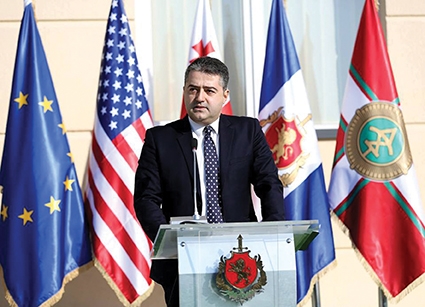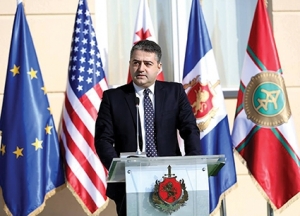Priorities & Reforms of MIA Border Police
GEORGIA TODAY met Major General Dato Nikoleishvili to find out about the ongoing reforms at the Border Police of Georgia under the Ministry of Internal Affairs.
“Georgia`s location in the region and its geographic characteristics create a unique variety of perspectives and challenges in terms of Border Management. The Visa Liberalization process with the EU further increased the importance of efficient and well-coordinated work by the Border Management agencies. We’re aware of existing risks and, therefore, are taking all necessary measures to cope with the challenges we face and make utmost use of the opportunities we have.
“The Government of Georgia has identified Border Management as one of the top priorities of its policy. The Integrated Border Management (IBM) Strategy and its Action Plan, which has been approved by the government, is built on the European four level control model (internal control activities within the country, control at borders, cooperation with neighboring countries, and activities implemented in the third countries) and encompasses border control, border surveillance, risk analysis, operational effectiveness, and cooperation between border control agencies on an interstate and international level, as key pillars of the strategy.
“Based on the IBM principles, we are oriented to develop the Land Border, Coast Guard and Aviation capabilities based on strong analysis, skilled personnel and modern technologies. To this end, we have elaborated a development strategy, which is translated into the 5 year Modernization, Standardization and Unification Plan of the Border Police of Georgia.
“Based on thorough research and analysis of the system, structure and ongoing processes at the MIA Border Police of Georgia, the subsequent reformation process has been initiated. A new structure for the Border Police has been created, which is designed to ensure achievement of the strategic goals and further support application of modern approaches and technologies, as well as enhancement of cooperation with partner nations and organizations. The high leadership of the Ministry of Internal Affairs is very much focused on the development of the Border Police”.
Tell us more about that reformation process
I’d like to underline that this result-oriented and intensive reformation is ongoing. We’re working particularly hard on the following directions: development of the institutional capabilities of the Border Police of Georgia; modernization of Command, Control, Communication and Surveillance Systems; implementation of high, modern technological systems – BOMS project; strengthening informational technology policy and development; development of border infrastructure; enhancing Border Police interdiction capabilities; modernization and unification of Coast guard and Aviation Fleet; and advancement of the modern information and knowledge management processes through the establishment of a Unified System of Risk Analysis at the State Border of Georgia.
In the rapidly changing environment, our top asset is our service personnel, who need to be given a proper working environment, equipped with the right set of skills and provided with relevant equipment. That is why the cornerstone of our reform is transformation of the human resources management practice. In order to ensure that our employees meet a higher degree of proficiency, as well as current and future demands, the Professional Development section has been created, responsible for planning, implementing and evaluating the Professional Development programs. The Border Police of Georgia is devoted to increasing new capabilities with the new highly qualified personnel. We’re grateful to the US Government that, for the first time in the history of the Georgian Border Police, two Georgian youngsters will have the opportunity to study at the USCG Academy. After Graduation, the two western educated officers will join the Georgian Coast Guard. Further, recently, in cooperation with the Academy of the MIA, a one-month Officers’ Training Course was established to train all the officers of the Border Police.
Development in the analytical direction is also our top priority. We’re focused on the development of the institutional mechanisms crucial for the improvement and modernization of the Border Police of Georgia. In this regard, as mentioned above, we’re implementing a Unified System of Risk Analysis at the State Border which will ensure timely identification of risks existing there, as well as the gaps and challenges in the field of migration and border management, after which we’ll develop effective mechanisms for the implementation of responsive and preventive measures. The system will support optimal decision-making aimed at risk reduction with consideration of the available resources and capabilities.
Nowadays, the current threats have acquired more generalized, common characters, meaning that no single country on its own can deter and handle the risks. Therefore, cooperation with the neighboring countries, partner states and international organizations has vital importance in seeking efficient and practical solutions for ensuring security. We are committed to stronger ties with our international counterparts and donor organizations, which substantially assist us in ensuring application of joint efforts towards coping with the common security challenges.
Cooperation with partner countries and international organizations is the cornerstone to successful attainment of our reforms and goals. Our strategic partners, USA and the European Union, have strengthened the State Border of Georgia in terms of Institutional Development and Capacity Building. We are extremely thankful and acknowledge the role of the US Defense Threat Reduction Agency (DTRA), Export Control and Related Border Security (EXBS) Program, US Department of Energy, EU Delegation to Georgia, International Organization for Migration (IOM), UN and its subordinate agencies for their role in the transformation and development of the Border Police.
The MIA Border Police of Georgia has a very fruitful cooperation with neighboring countries - Turkey, Azerbaijan and Armenia. Successful projects are being implemented with the Baltic States within the framework of bilateral cooperation. The MIA Border Police of Georgia intensifies its cooperation with the border protection agencies of Finland, Greece and Poland.
Recently, a Cynological Center was opened with the great support of our strategic partner, the US. The project was implemented and funded by the US Defense Threat Reduction Agency (DTRA). The Center contributes to the capacity building of the MIA Border Police and further enhances Georgia’s land border security. It’s already staffed and is properly functioning and we’re now elaborating a development plan for the Cynological sphere.
The NATO Secretary General multiple times emphasized the importance of the Black Sea basin. What is Georgia’s role in terms of ensuring security in the region?
Georgia’s role in ensuring and maintaining security in the region is important. Georgia is a reliable NATO partner with a contributing role in ensuring security and peace in the Black Sea Basin.
Attaining higher standards and developing the Coast Guard are among the top priorities of the Border Police, where the Joint Maritime Operation Center (JMOC) represents an indivisible part of the Border Police of Georgia. With the great support of the United States, JMOC functions within the Border Police of Georgia. This Center will ensure full maritime domain awareness as it will have integrated data from all maritime agencies -Coast Guard, Patrol Police Department, Revenue Service (Customs), Maritime Transport Agency (under the Ministry of Economy and Sustainable Development), Ministry of Environment and Natural Resources Protection, State Security Agency, Ministry of Defense and others. We believe JMOC will serve as a strong analytical hub during peace time, as well as ensure coordinated operations during crises and in case of war.
The Objectives of the JMOC are:
• To control the legal regime of the territorial waters of Georgia: threat prevention, detection and subsequent response; efficient interoperability between the responsible and relevant agencies; information sharing in order to prevent unnecessary duplication of efforts. The JMOC coordinates the activities of the agencies responsible for the maritime border protection and ensures efficient national resource allocation and utilization during crisis and peacetime;
• To support search and rescue activities at sea; ensure the security of ships and cargo and environmental protection in the maritime space of Georgia; establish an interagency cooperation mechanism for detecting/identifying, analyzing, notifying and responding to the threats and challenges in real-time;
• To deepen cooperation, exchange information and participate in joint operations with other countries of the Black Sea region as well as with international partners.
As the Head of the Border Police, I believe that the Joint Maritime Operation Center is the strength of our country and particularly the Georgian Border Police. Its operational efficiency is our top goal. Under my leadership, the necessary procedures were expedited to guarantee timely and effective functioning of the JMOC. We are in consultation with the NATO Maritime Command and National Maritime Information Center of the United Kingdom in order to elaborate mechanisms for information exchange between JMOC and the abovementioned agencies. We acknowledge JMOC’s importance on a national as well as international level. This is a unique concept and we’re working very hard to make it fully-functional for the benefit of Georgia and Georgia’s reliable partner countries.












